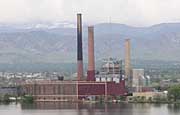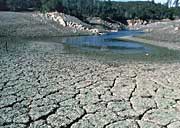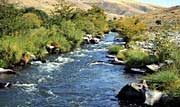
skip to content program navigation
| Learn more about these CLIMATE RESEARCH areas... |
Regional Climate Services
As leaders in the field of climate research, NOAA's research laboratories, joint institutes and programs are working to meet local and regional needs for climate information. These activities provide information that describes and explains climate and its impacts on natural systems and human activities, and climate prediction products and services (such as seasonal forecasts and threats assessments) for use by decision-makers and the general public. These activities also support NOAA's mission to understand and predict changes in Earth's environment in order to meet our Nation's economic, social and environmental needs. These activities are also helping NOAA meets its goal of increasing the number and use of climate products and services to enhance public and private sector decision-making.
Regional Decision Support
There are increasing needs for research addressing complex climate sensitive issues of concern to decision-makers and policy planners at a regional level. To meet these needs, NOAA's Climate Goal has established a Regional Decision Support (RDS) effort to accelerate the Program's interaction with users of climate information and forecasts at multiple spatial and geographical scales. This is especially important given that climate change and variability has emerged as a major public policy issue over the last decade, particularly with regard to impacts in sectors where the economic, social/cultural, and public health consequences are high.
The RDS portfolio helps NOAA identify and serve the nation's needs for climate information to support decision making through an integrated program of: 1) research and assessment related to impacts and decision making needs; 2) transition of research to operations; and 3) operational production and delivery of local and regional climate services that can be utilized to enhance adaptive management options.
A fine example of how NOAA is involved with RDS as related to societal impacts is through the creation of the International Research Institute (IRI), which was established as a cooperative agreement between the U.S. NOAA Climate Program Office and Columbia University. IRI is a one-stop source of regional and global climate information, which is created both in-house and aggregated from external sources (e.g. National Center for Environmental Prediction (NCEP), and is used by policy makers to minimize the societal impacts of climate variability (e.g. El Nino). Examples of products provided by the IRI include global seasonal outlooks, El Nino forecasts, and seasonal hurricane outlooks.
In support of the research component of the RDS effort, the newly established NOAA Sector Applications Research Program (SARP) will identify and promote research and application priorities that foster improved decision support for fundamental climate-related issues in key socio-economic sectors (e.g., coastal, water resources, agriculture, health, etc.). NOAA Research supports the transition of climate information tools and management insights into user-relevant products through the NOAA Climate Transition Program. This program provides a mechanism for supporting research that addresses user needs and requirements, transitioning the research to operations, and providing education and outreach capacity for new products.
One of NOAA Research's most successful university partnership programs is the Regional Integrated Sciences and Assessments (RISA) program. The RISA program endeavors to improve interactions with local and regional stakeholders to determine climate service needs; increase the utility of climate information for decision makers; advance science and provide feedback into research; field test and refine new products; and link research with planning and operations.
The NOAA Climate Program Office funds eight RISA projects to provide NOAA with information about how to construct its emerging "National Climate Service," the climate analog to the existing National Weather Service. While each RISA targets a specific U.S. region, the work of the each of RISA extends past these boundaries-creating research and products that are useful for stakeholders across the country and beyond. RISA research has grown from assessing the impacts of climate variability and longer-term climate change on fisheries, water, wildfire, and agriculture sectors to include research into climate sensitive public health issues and coastal restoration, and to improve environmental management. To ensure effective use and usefulness of climate products and services, individual RISAs hold ongoing periodic meetings with sectoral representatives and decision makers. Coming out of these interactions, individual RISAs have been asked to serve on or provide regular briefings to planning committees and task forces.
For example, NOAA researchers collaborate as part of the Western Water Assessment. This RISA is a multidisciplinary team of experts in climate, water, law, and economics, which provides information about natural climate variability and human-caused climate change. This information, often in the form of climate data, analysis and forecasts, and regional vulnerability assessments, is designed to assist decision-makers in managing water resources in order to mitigate the effects of extreme events such as droughts and floods.
Experimental Climate Products
NOAA research, though built on a foundation of investigation into key processes driving the interaction between the ocean and the atmosphere, has included since the early 1990s research that seeks to increase our understanding of exactly how climate shapes and influences conditions important to humans, and, as importantly, how can individuals and institutions better incorporate data, analysis, and forecasts having to do with climate into their existing decision making processes. NOAA research laboratories are developing experimental products and information that support public decision-making and policy development. These new or enhanced region-specific experimental climate products provide practical solutions to specific regional climate problems. Over the years, information has been developed to address climate-sensitive issues concerning agriculture, climate change, energy, tropical storms, the environment, human health, risk management, transportation, and water resources. Listed below are the Office of Oceanic and Atmospheric Research (OAR) labs who are actively pursuing research targeted at improving NOAA's RDS capability.
Researchers at AOML are working with the South Florida Water Management District to understand the role of climate variability in regional water management decisions and the potential benefits possible of improved seasonal to multi-seasonal climate forecasts in allocation and management decisions.
Researchers at ESRL have engaged with Federal, State and local emergency managers in California in the use of experimental regional ground and air based observations to monitor the evolution of extreme climate events and manage risks associated with high rainfall events and flooding.
GFDL has partnered with the Cooperative Institute For Climate Applications And Research to transform the prediction and projections of climate variability and change into information that supports regional decision-making and societal risk assessment.
ESRL researchers are working closely with the Colorado Water Availability Task Force to develop experimental sub-seasonal to seasonal climate predictions and outlooks at the temporal and spatial scales where state and local government decisions are made.
As part of NOAA CoastWatch, GLERL researchers obtain, produce, and disseminate environmental data and products for near real-time observation of the Great Lakes to support environmental science and decision-making.
The Earth System Research and Air Resources Laboratories assist decision makers by identifying unanticipated factors that cause a region's particular air pollution episodes - information that enables state agencies to develop the most effective and most economical approaches to improving air quality and thus public health.
PMEL has partnered with the Alaska Fisheries Science Center to improve understanding of ecosystem dynamics and applying that understanding to the management of marine resources to ensure the survival of commercially valuable fish in the western Gulf of Alaska.
Transitioning Research to Operations
The NOAA Climate Transition Program (NCTP) is a granting program within the NOAA Climate Office that provides support to transition of climate information tools and management insights into user-relevant products. The NCTP funds development of new or enhanced regional products, information delivery technology, and sustained and systematic communication and feedback, especially at the grass roots level. The program goals are to focus NOAA funds to facilitate transition of climate information tools into operational products to meet user/decision maker requirements, develop a deliberate bridge for research to applications, advance focused scientific research, and increase scientific capacity. NOAA research laboratories contribute to the research to operations process through collaborations with the operational branches of NOAA to transition climate research into usable regional prediction products and services.
A large part of non-transportation energy demand is for heating and cooling. These demands are heavily influenced by climate.
Collaborative projects provide scientific knowledge needed to anticipate, track, and respond to threats such as drought and wildfires at regional and local levels.
Climate forecasts and regional vulnerability assessments are provided to assist water-resource decision makers. |
NOAA Research programs that provide Regional Climate Services
![]() NOAA
Climate Program Office (CPO)
NOAA
Climate Program Office (CPO)
![]() Atlantic
Oceanographic and Meteorological Laboratory (AOML)
Atlantic
Oceanographic and Meteorological Laboratory (AOML)
![]() Earth
System Research Laboratory (ESRL)
Earth
System Research Laboratory (ESRL)
![]() Geophysical
Fluid Dynamics Laboratory (GFDL)
Geophysical
Fluid Dynamics Laboratory (GFDL)
![]() Great
Lakes Environmental Research Laboratory (GLERL)
Great
Lakes Environmental Research Laboratory (GLERL)
![]() Pacific
Marine Environmental Laboratory (PMEL)
Pacific
Marine Environmental Laboratory (PMEL)
![]() Air
Resources Laboratory (ARL)
Air
Resources Laboratory (ARL)
Additional Related Information



